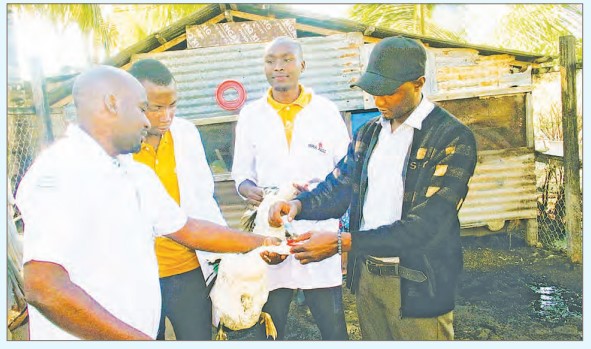Samia’s free vaccination sees early success in Mtwara

EARLIER last Month, President Samia Suluhu Hassan launched a nationwide livestock vaccination and identification campaign aimed at boosting productivity in the livestock sector and enhancing its contribution to the national economy.
The four-year initiative, spanning from the 2024/2025 to 2028/2029 financial years, will cost 216bn/-. It involves the vaccination and identification of cattle, goats, sheep and poultry, to reduce livestock mortality from preventable diseases and improve yields.
Speaking at the launch event held on Monday in Bariadi District, Simiyu Region, President Samia described the campaign as a transformative step that will modernise livestock keeping and strengthen export potential.
“This nationwide campaign will be a game-changer, helping to eliminate live‑ stock diseases and significantly increase production, while establishing a comprehensive livestock database,” she said.
Her declaration is already taking shape on the ground, with remarkable progress reported in regions across the country, including Mtwara-Mikindani Municipality, which is fast becoming a model for modern livestock farming.
In Mtwara-Mikindani Municipality, the Department of Agriculture, Livestock and Fisheries has successfully vaccinated 53,568 chickens, representing 86.3 per cent of the 62,000 targeted under the campaign. Traditionally known for its cashew farming and fishing industry, Mtwara is now increasingly embracing livestock farming, with strong support from initiatives like this free national vaccination and identification programme.
The campaign employs barcode technology to tag animals, allowing for better tracking of health, vaccination history and productivity. Despite Tanzania holding the second-largest cattle population in Africa after Ethiopia, the livestock sector currently contributes only 6.2 per cent to the national GDP, something this campaign aims to change.
According to the municipal vaccination coordinator, Dr Paulo Sambula, vaccinated poultry received a “3-in-1” vaccine protecting against Newcastle dis‑ ease, fowl pox and avian influenza. Bariki Mwandunga, a livestock officer at the Mtwara-Mikindani Municipal Council, explained that this type of vaccination provides preventive protection against these diseases with a single dose, offering significant relief to low-income livestock farmers.
“This approach is particularly beneficial to low-income livestock keepers, as a single dose provides broad protection,” said Mwandunga. The municipal vaccination team, consisting of approximately 13 vaccinators, has visited all 18 wards in the municipality, delivering essential vaccines to beneficiaries.
The team, led by Veterinary Officer Dr Sambula, included livestock field of‑ ficers Perezi Mvula, William Mlelwa, Denis Nyella and Asma Mahamoud. Others are Livestock Officers Bariki Mwandunga, Saimon Elias, Lidya Ny‑ igo, Francisco Nduye, Edwin Matimba, Grace Ngongo, Yusuph Achiula and Godwine Gacharo.
During vaccinations in the Magomeni ward, Livestock Officer Saimon Elias shared that the national livestock vaccination and identification campaign aimed at boosting productivity was launched in Masasi District on July 5, this year.
He stated that the campaign was in‑ augurated by Agnes Kisaka Meena, the Permanent Secretary in the Ministry of Livestock and Fisheries, alongside Mtwara Regional Administrative Secretary CPA Bahati Geuzye, who expressed gratitude to President Samia Suluhu Hassan for her concern for livestock farmers and for providing them with vaccines.
He added that CPA Geuzye also pledged to ensure the effective manage‑ ment of the vaccination exercise in the Mtwara region to guarantee its success.
As the campaign progresses in Mtwara Municipality, Livestock Officer Perezi Mvula reported that all Mtwara Mikindani Municipal wards have been vaccinated. Mvula listed the wards already covered, including Majengo, Chikon‑ gola, Likombe, Reli, Shangani, Vigaeni, Chuno, Ufukoni, Rahaleo, Naliendele, Magomeni, Mtawanya, Tandika, Jang‑ wani, Kisungule, Mitengo, Mtonya and Magengeni.
Additionally, he said that the municipality has received 5,000 doses of cattle vaccine to prevent pneumonia and 5,700 doses for sheep and goats to com‑ bat Pestedes Petits Ruminants (PPR), a viral disease affecting these animals. “Beyond poultry, the municipality also received 5,000 cattle vaccine doses to prevent pneumonia, 5,700 doses for goats and sheep to prevent Pestedes Petits Ruminants (PPR) locally known as “Sotoka ya mbuzi na kondoo”, a highly contagious viral disease affecting small ruminants.
“PPR is deadly, causing fever, dis‑ charges, coughing, diarrhoea and ultimately death. It poses a serious threat to the livelihoods of pastoralists,” said Mvula.
Providing an overview of the campaign, Mwandunga described it as largely successful, noting the overwhelming response from the community. He urged those who arrived late to change their mindset and respond promptly in the future to streamline the logistics of vaccine distribution.
“In summary, this is a success for our department and the Municipality as a whole. However, I would like to emphasise that when we announce the availability of vaccines, it is crucial for people to come forward early to facili‑ tate the process,” he remarked.
Beneficiaries of the campaign echoed their appreciation for the initiative, which has significantly reduced the cost burden of livestock care. Grace Francisco, a resident of Magomeni Ward, remarked, “This has truly been a relief for us, as many of us live on limited incomes. We are immensely grateful for this free service.” She, along with other livestock keepers, commended President Samia for her dedication to the welfare of farmers and requested that those tasked with administering the vaccines do so with integrity to achieve the campaign’s goals.
“This has been a great relief for many of us who live on modest incomes,” insisted Ms Francisco.
“We thank the President for this generous support. Now we ask that vaccinators carry out their duties with integrity to fulfil the President’s vision.” At the launch in Bariadi District, President Samia reiterated the importance of using barcodes for animal identification, which enhances monitoring of livestock health and productivity.
Despite Tanzania being ranked second in Africa after Ethiopia in cattle population, President Samia noted that the livestock sector’s contribution to the national GDP remains low only 6.2 per cent.
She attributed this underperformance to a lack of proper vaccination, weak data systems and traditional live‑ stock-keeping practices. The initiative also seeks to improve the entire livestock value chain, from production to processing and marketing.
Dr Samia revealed that government interventions have led to an increase in meat exports from 692 tonnes in 2021/2022 to 14,701 tonnes worth over 61.4 million US dollars (about 158bn/-) in 2023/2024.
Earlier, Minister for Livestock and Fisheries, Dr Ashatu Kijaji said that the ministry’s budget has surged from 66bn/- in 2021 to 406bn/- in the upcoming financial year, an increase of more than 600 per cent.
President Samia also used the occasion to stress the importance of domestic investment in boosting employment and preserving foreign currency. She urged all the people to pay taxes and support local development initiatives.
President Samia’s campaign, combining vaccination with modern identification systems is proving to be more than just a policy; it’s a catalyst for trans‑ formation in Tanzania’s livestock sector.





